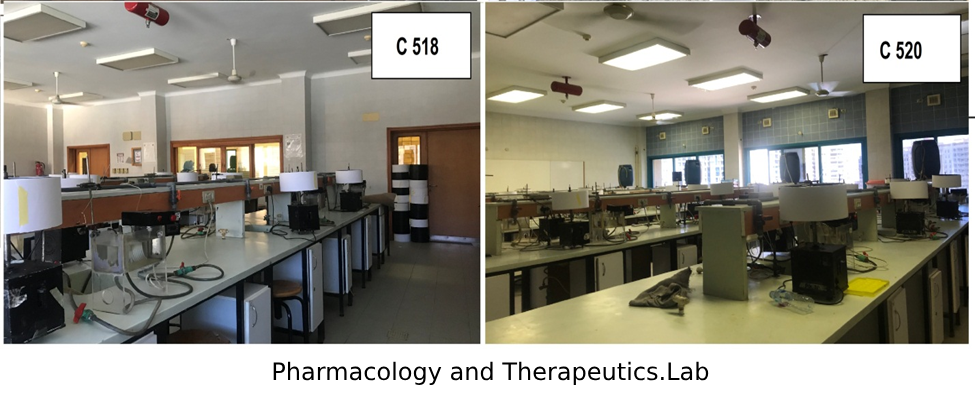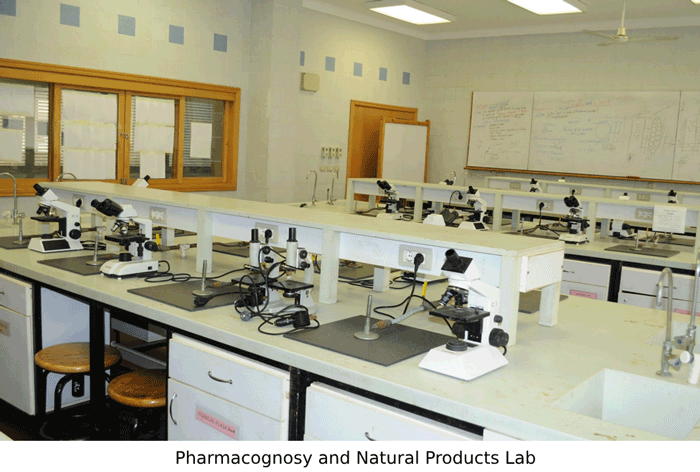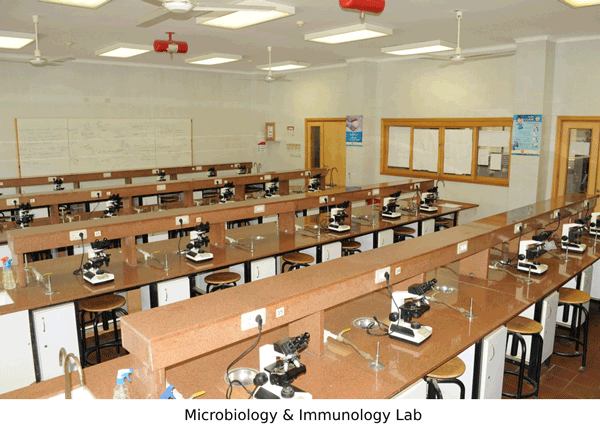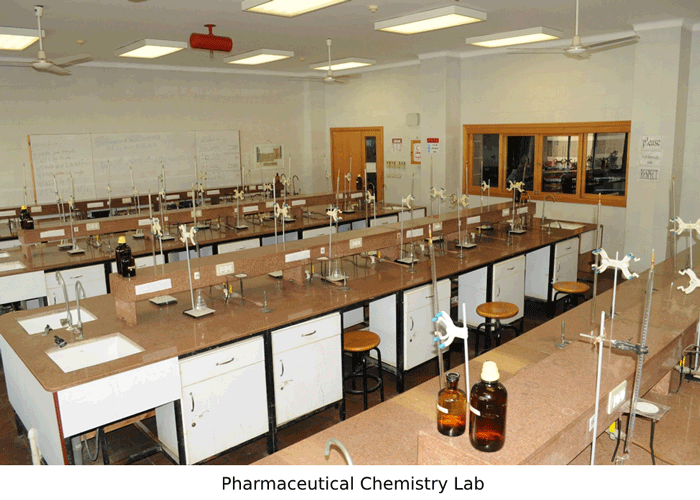Facilities of the Faculty of Pharmacy – Pharos University in Alexandria
The buildings of the Faculty of Pharmacy at Pharos University are distinguished by their spaciousness, adequacy, and adequate capacity for the number of students, even exceeding the standard national standards. The buildings are also characterized by their suitability for the institution’s activity in terms of design, space, and the nature of the institution’s activity. The financial capabilities and human resources of the College of Pharmacy include auditoriums, classrooms, laboratories, the animal house, the pharmaceutical factory, the model pharmacy, the library, and the computer and language laboratories.

Available scientific equipment
Looking at the area of the auditoriums and classrooms, we will find that the college has 8 auditoriums for general lectures (2 auditoriums with an area of 258 m2, sufficient to accommodate 500 students, with 250 students per auditorium, and 6 auditoriums with an area of 144 m2, sufficient to accommodate 660 students, with 110 students for each auditorium). It is affiliated with the College of Pharmacy. A plan to distribute the students to make optimal use of that space during lectures, where one batch is divided into groups, which makes the capacity of the teaching halls exceed the percentages stipulated in the guidebook for space and human resources standards, which allows maximum interaction between the student and the lecturer.
All halls are equipped with good lighting and ventilation systems, an audio system with wall speakers distributed throughout the auditorium, and a microphone for the lecturer. They are also equipped with a data display device.
The College of Pharmacy contains the following specialized laboratories:
- Laboratories of the Department of Pharmaceutical Chemistry.
- Laboratories of the Department of Pharmacognosy and Natural Products.
- Laboratories of the Department of Microbiology and Immunology.
- Laboratories of the Department of Clinical Pharmacy and Pharmacy Practice.
- Laboratories of the Department of Pharmaceutics and Pharmaceutical Technology
- Laboratories of the Department of Pharmacology and Therapeutics.
- Experimental pharmaceutical factory.
All laboratories are equipped with various laboratory devices, equipment and tools according to specialization, which are constantly updated
The pharmaceutical factory located on the ground floor of the Faculty of Pharmacy building at Pharos University is an educational factory for undergraduate students at the college, equipped with the latest devices and equipment.
The factory is divided into two units:
– The first unit: It is a pharmaceutical manufacturing unit at the laboratory level in which students are trained to apply different methods in preparing pharmaceutical preparations from coated and uncoated tablets, capsules, suppositories, etc., using the devices in the unit, which include dry and wet granulation devices, and a vesicle/fine particle preparation device, cladding suits, ovens, scales, etc.
-The second unit: It is the quality control unit for pharmaceutical preparations, in which the student is trained to use various devices such as devices for measuring the rate of dissolution, hardness, fragility, and disintegration of tablets, a quantitative analysis device with visible and ultraviolet rays, in addition to a device for measuring the viscosity of liquid and semi-solid preparations and devices for measuring the properties of powders. And others
To ensure the progress of the educational process and the maintenance of the devices, there are qualified specialists who operate these devices and supervise their maintenance.
A building adjacent to the College of Pharmacy building was created for several purposes including:
– Internal training for college students to work in pharmacies.
– Conducting practical classes for some of the courses taught at the college, such as (Community Pharmacy)
The internal summer training program for students at the college aims to enrich the student’s scientific background, link theoretical information with the practical application of the pharmacy profession, and introduce the student to the real role of the pharmacist, which is not limited to reading drug prescriptions and dispensing them but rather includes dealing with patients from the public who frequent the pharmacy and cooperating with the medical staff in determining The correctness of the doses and the presence of any possible interactions between the prescribed medications and the provision of health care to patients with professionalism and respect.
This training is carried out by dramatizing some cases that face pharmacists in the pharmacy and how to deal with them and provide advice to them.
To achieve this goal, the typical pharmacy contains:
- Cabinets in which various pharmaceutical preparations are arranged.
- A place for preparing pharmaceutical formulations.
- A special place where the pharmacist provides patient counseling.
- computers.
- Several tables and chairs for discussion.
- Show Data display device and screen
The Animal House building consists of one floor and is adjacent to the College of Pharmacy building.
The building consists of four air-conditioned rooms equipped with multi-shelf racks to accommodate cages of rats (laboratory mice). The animal house contains two types of Sprague-Dawley rats (males and females) of various weights to cover the needs of students in different academic levels, as well as research for postgraduate students at the Faculty of Pharmacy.
In the framework of cooperation with research bodies at Alexandria University, the action of selling rats to researchers in the faculties of pharmacy, medicine, science, and agriculture has already begun.
To ensure the general care of the animals, qualified specialists supervise the rats’ subsistence, feeding, reproduction, and general cleanliness of the place.
Pharos University provides its services to students of various colleges through a central library. The university has given the library special attention and provided it with sufficient resources to enrich its collections of books and references in various specializations, introduce modern technologies, and use information technology.
The library opens its doors to serve its visitors throughout the day, and a large number of students and faculty members benefit from its services daily by viewing, borrowing, using computers to prepare research, or accessing the Internet to collect scientific information.
In addition to the library, the university has reading halls that provide a quiet environment for students to study, collect, and use the Internet wi-fi between lecture times or practical classes. There is also an electronic library containing subscriptions to some scientific journals, important scientific websites, and software.
The student attends practical classes for the computer course in the computer laboratories in the theoretical colleges building and the Faculty of Engineering. In addition to the new computer laboratories on the ground floor and fifth floor of the Faculty of Pharmacy, which contain 150 computers for use in some academic courses to raise the efficiency of education and also for postgraduate students. It is worth noting that the devices are connected to the Internet and contain visual and audio devices, LCD screens, and display devices. Further, several new programs have been introduced that are useful in teaching some academic courses.
There are 4 halls on the ground and fifth floors, equipped with computers for use in various educational purposes and connected to the Internet. They contain visual and audio devices, LCD screens, and projectors. Several new programs have been introduced and are taught in various courses.
One of the halls is attached to a pharmacy simulation, and there is also a place for training in clinical pharmacy. Through the unit, students are trained and provided with the necessary pharmaceutical cognitive skills, and simulate what happens in hospitals and health institutions. The laboratory was designed to serve educational objectives such as group discussions, case studies, and group work skills, by presenting health and disease problems and finding solutions to them by working in groups and creating a competitive spirit among the different teams. It also accommodates the educational objectives of developing individual skills so that each individual can find solutions and case studies through the Internet and global software and discuss solutions with their peers at the end of the practical sessions.
The faculty has begun to offer the following postgraduate programs:
- Master’s degree in pharmacology and toxicology.
- Master’s degree in analytical and pharmaceutical chemistry.
- Master’s degree in Pharmaceutics and Pharmaceutical Technology.
- Diploma in Hospital Pharmacy.
The faculty was keen to provide the latest technologies applied in the field of scientific research and to complete the pharmaceutical research complex. The complex provides all modern capabilities for researchers and students for master’s, doctoral, and diploma degrees, as it contains 7 laboratories in all specializations in the Faculty, and each laboratory includes the equipment of its department, which facilitates the work of researchers.
Instrumentation Laboratory
It includes a group of modern standard scientific devices such as:
FT-IR, HPLC, U.V-Visible Spectrophotometer, Gas chromatograph, Refractometer, Polarimeter, and other modern standard devices.
The research complex includes various research laboratories for the six departments of the Faculty:
Pharmaceutical Research Laboratory
It includes studying the stability of pharmaceutical preparations, developing new pharmaceutical preparations, determining the bioequivalence of pharmaceutical preparations, determining drug release rates, conducting studies on problems in the pharmaceutical industry, and preparing files for pharmaceutical preparations. It includes a group of modern standard scientific equipment
Toxicology and Pharmacology Research Laboratory
It specializes in studying the effect of new drugs on experimental animals and determining safe doses, degree of toxicity, and safety level of pharmaceutical preparations. It contains a Polygraph device and other devices through which the effect of the drug can be determined
Pharmaceutical Microbiology Research Laboratory
Research is being conducted to discover new antimicrobial compounds. Conducting microbiological tests on pharmaceutical preparations. It also develops biotechnology to identify and eliminate microbes and contains all the capabilities of scientific research
Pharmaceutical Analytical Chemistry Research Laboratory
It includes the construction of new pharmaceutical compounds and the innovation of new methods for drug analysis, in addition to the control of drugs and raw materials. It contains devices and capabilities for scientific research.
Natural Products Chemistry Research Laboratory
It includes the discovery of Egyptian plants that are suitable as raw materials in the pharmaceutical industries, the development of new herbal formulations, the extraction and separation of effective substances from medicinal plants, and also the pharmaceutical control of raw materials and herbal preparations, and it is equipped with the necessary equipment for this.
It is a research laboratory that contains many devices for the production and characterization of nanomaterials, which in turn contributes to the development of research outputs and increases the rate of international publication of scientific research.
The Pharmaceutical Nanotechnology Unit at the Pharmaceutical Research Complex was opened in February 2019.
The unit aims to serve researchers at the College of Pharmacy and other colleges to conduct research in the field of nanotechnology. The unit contains a group of modern devices that were selected according to appropriate standards for this type of research:

It is located on the sixth floor, a distinctive, air-conditioned hall for holding various conferences, seminars, and workshops, as well as postgraduate lectures. It is equipped with the latest audio-visual equipment and can accommodate 100 people.































